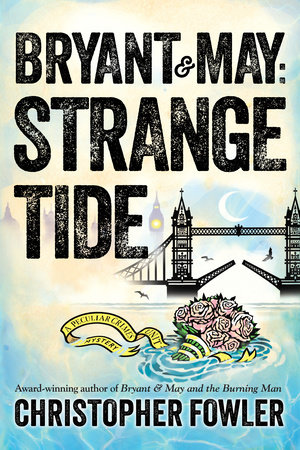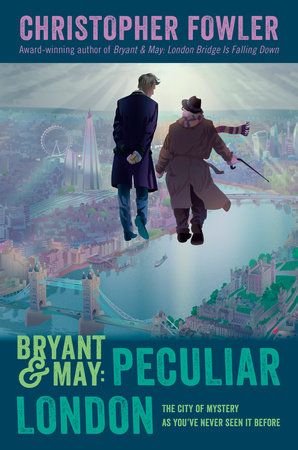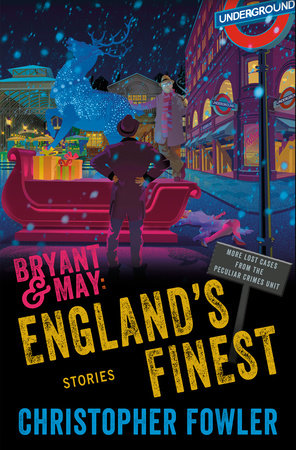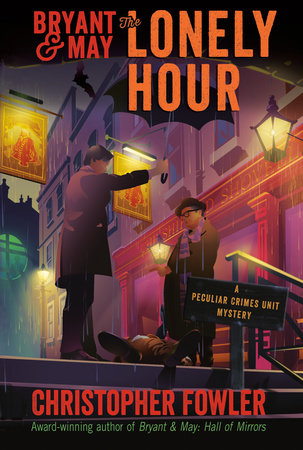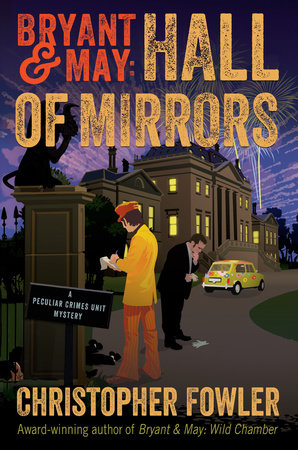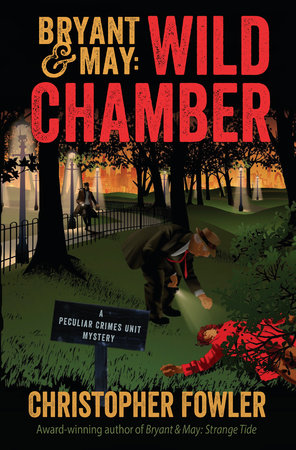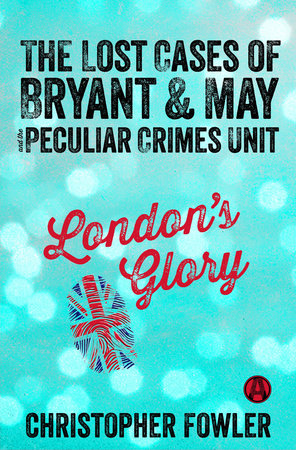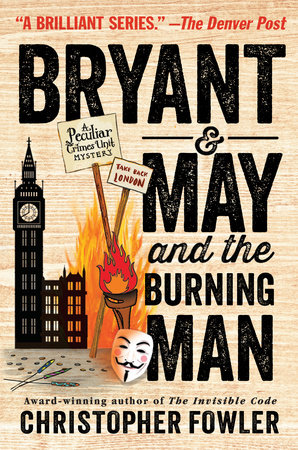Excerpt
Bryant & May: Strange Tide
Part One
|
Going Away
I walk till the stars of London wane
And dawn creeps up the Shadwell Stair.
But when the crowing syrens blare
I with another ghost am lain.
—Wilfred Owen
The Thames is too dark to lack a god.
—Carrie Etter
1.
Queens & Kings
Nothing gave Arthur Bryant greater satisfaction than making his first blotch on a fresh white page. The scratch of the nib as it scarred the paper always sent a tingle through his fingertips.
‘I’ve decided to write up that business of the Clapham Common Casanova,’ he announced, turning to the new notebook on his desk and opening it with a theatrical flourish. Uncapping his fountain pen, he made a grand downward stroke.
Nothing came out.
He shook the pen violently. Ink spots flew all over the office. Crippen, who had been happily sleeping beside his desk, sprinted from the room.
‘I thought Raymond didn’t want you circulating any more of your dodgy memoirs,’ said John May. ‘You make our investigations sound like terrible old paperback murder mysteries.’ He swiped irritably at his smartphone. ‘Why won’t this thing sync properly?’
‘Nothing modern works properly,’ Bryant cheerfully replied. ‘Everything is overcomplicated. The office tea bags are sentient, apparently. They have a Twitter account. It says so on the box. Dan Banbury bought me electronic bathroom scales for my birthday. They told everyone on Facebook how much I weigh. I don’t need inanimate objects slagging me off.’
‘But you still use them?’ asked May.
‘No; tragically, they fell under the wheels of my car. Your phone is probably working fine, you’re just losing the ability to keep up with it. You’re deteriorating, like everything else around here.
‘ “Things fall apart; the centre cannot hold;
Mere anarchy is loosed upon the world,
The blood-dimmed tide is loosed, and everywhere
The ceremony of innocence is drowned . . .”
‘Yeats. No amount of colouring your hair and sucking in your gut will change that.’ Pleased with himself, he sat back and took a sip from his tea mug.
It is said that the hallmark of a gentleman is that he is only ever rude intentionally. Arthur Bryant was no gentleman. His rudeness came from an inability to cloak his opinions in even the most cursory civility. He believed in good manners at the meal table and bad manners almost everywhere else.
‘You’re a very unpleasant old man,’ May replied, returning to his phone.
‘What’s the point in consensual opinion?’ Bryant asked, exasperated. ‘If you only discuss matters of interest with like-minded individuals you never learn anything new. Why would I want a peer group on Twitter? They’re just going to agree with me.’
‘Nobody ever agrees with you, and besides, you’re not even supposed to be here. You’re meant to be resting after—’
‘I’m feeling a lot better this morning. If I gave you details of all my ailments we’d be here until the next coronation, so can we move on?’
‘Very well.’ May peered across his desk at the open notebook. ‘If you’re planning to set down those cases in chronological order, the Bride in the Tide should be next.’
Bryant raised the fingers of his right hand. ‘Three—no, two things. One, please don’t call it by the name a tabloid reporter coined after a five-bottle lunch, and B, it’s the only case I won’t ever be able to write up in my superbly erudite and illuminating chronicles.’
May gave up with his phone and set it aside. ‘Why not?’
‘Because,’ Bryant pointed out, ‘it’s one of the only times we nailed the culprit but were given the slip. My public wants to read about the successes, not the failures.’ He rose and walked over to the window, to jingle the change in his pockets and survey his kingdom.
‘Your public?’ asked May. ‘You haven’t got a public. You were complaining about your phone not ringing the other day. There’s nothing wrong with it; you’ve never given anyone your number. Anyway, the case wasn’t an entire failure. Your suspicions turned out to be justified.’
‘It still didn’t end up with a spell in the pokey for—I forget the name of the malefactor now. It was on the tip of my tongue, began with a B. Boadicea.’
May looked up. ‘I’m sorry?’
Bryant was still looking down into the street. The houses on the other side were ochreish and meanly windowed.
‘Queen Boadicea. She’s over the road, just past the fried chicken shop. How very odd.’
‘Take one of your yellow pills,’ said May, allowing his fingers to creep back towards his phone.
|||
Boadicea, the great warrior queen, was sitting on a garden wall opposite, dangling her silver sandals over its edge, her coarse-woven purple robe gathered about her waist, her golden breastplate glinting in the cold morning sunlight. The breeze ruffled the dyed red leveret fur on her bronze helmet. She was contemplatively licking the side of a 99.
‘I don’t know how you can eat that,’ said the Roman centurion next to her. ‘It’s bloody freezing.’
‘I’m the Queen of the Iceni,’ said Boadicea. ‘I don’t feel the cold.’
The centurion pointed to her ice cream. ‘Why is it that the flakes in those things never taste as good as the Cadbury Flakes you buy in the yellow wrappers?’
‘I can’t comment,’ said Boadicea. ‘Chocolate hasn’t been invented yet.’
‘You don’t have to stay in character all the time.’
‘When I was a kid we spelled it B-O-A-D-I-C-E-A. That was how everybody spelled it. Then all of a sudden it was B-O-U-D-I-C-C-A. Where did that come from?’
‘You were a Victorian misprint.’
‘I’ve got my own statue on Westminster Bridge. You’d think they could sort out my name.’
‘It’s B-U-D-D-U-G in Welsh,’ said the centurion, who was Welsh.
‘They don’t even know where I died! It was either Watling Street, East Anglia or over there, under platform nine.’ She pointed to the great arched glass roof of King’s Cross Station in the distance.
‘You’re thinking of Harry Potter,’ said the centurion.
‘Did you even bother to do any research before you took this part?’ Boadicea asked, gnawing the end off her cone.
‘It was hardly worth it,’ said the centurion. ‘I just come on, shout a bit and get a spear shoved through me.’ In the gardens behind him, the second assistant director called everyone back to their places. ‘Looks like they’re going for another take,’ he said. ‘Are you in this scene?’
‘No, I’ve finished for the day.’ She crunched up the last of her wafer and wiped her fingers on a dock leaf. ‘I’m going to get out of this outfit. I thought it would be a bit of a novelty doing location work instead of green-screening everything down at Pinewood, but I’ve spent most of my time staring out at King’s Cross and watching plainclothes coppers going in and out of that building on the corner.’ She pointed up at the headquarters of the Peculiar Crimes Unit on Caledonian Road.
‘How do you know they’re coppers if they’re in plain clothes?’ the centurion asked.
‘They have big feet and matching jackets and are always carrying takeaways,’ said Boadicea. ‘What else could they be? I wonder what they do in there all day.’
The centurion shrugged. ‘What do you care? You’ve been dead for nearly two thousand years.’
‘You don’t understand,’ said the warrior queen. ‘I’m an actor. I observe humanity.’
‘You’re an extra, love,’ said the centurion. ‘And what could you possibly learn from watching a bunch of plainclothes plods?’
Boadicea waved a ringed finger in the direction of Raymond Land’s first-floor window in the Peculiar Crimes Unit. ‘I’ve learned that the bloke who sits in that room doesn’t do any work,’ she said.


